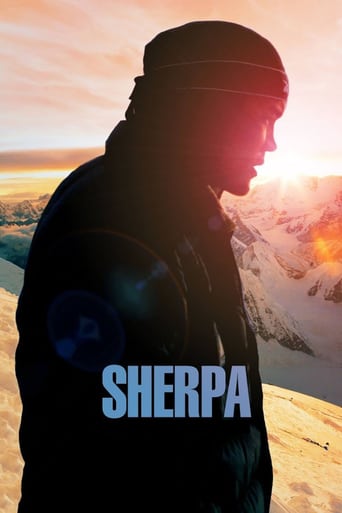plparshall
Hard to say - what was left on the editing floor but, it appeared to be from the Sherpa's perspective. One theme which rang through to me was the old 19th Century Master/Slave, Explorer/guide, Great White Warrior theme. And yes, during one of the down time cooling off talks one of the climbers did ask who "owned" the Sherpa who was making the trouble. I have never been over there but to me it seemed to be the Sherpa/Climber relationship has grown from the original 1953 Hillary climb where the climber's held the upper hand and the Sherpa's were subordinate - this film documents the reconsideration of that previous relationship. So it is a worthwhile documentary which I think all interested in climbing will enjoy. Now, personally for me, it's another crack in the wall of white supremacy, imperialism, whatever you want to call it. The hubris of these climbers who "brave Everest" when everything is prepared, lugged, cooked, constructed, behind the scenes by Sherpas is sickening. Their indignity at the Sherpas who dare have an opinion is amazing. Their insensitivity to local loss of life is embarrassing. Using the white supremacy term is serious so let me explain further. There is a movement in Congree to make the Buffalo our National Mammal. Ludicrous. We Europeans wiped out the Buffalo - some for sport some for tongues, and most tragically because we wanted to starve/force the Indians to the reservations so we could steal their land. One of the most noble civilizations ever along with the Buddhists and we wiped them out because we had our Manifest Destiny. What we are/were looking for could be found in the Indian way of life we destroyed. Ditto for chapter 2: the black man. We rape and slave them right out of Africa and act like it's their fault when they are "freed" and try to adapt to be 2nd class citizens. So we put a black on our money and make the Buffalo our national mammal - all fixed? Sorry for the rant but we treat the Sherpas with the same European contempt.
punishable-by-death
Mount Everest brings to mind many things. High altitudes, freezing temperatures and an increasing number of foreigners climbing the peak, at one point resulting in a traffic jam of epic proportions. It has become a business, with the Sherpa people always in the background; rarely expressing any emotion, helping out willingly as it is often the only way that these people can earn themselves a living – risking their lives time and time again to help complete strangers.This film is told almost entirely from the perspective of the Sherpa. As we watch we see the insane risks that these people put themselves through, we also learn about the Sherpa as a native people. Deeply religious, they pray constantly that their journey will be successful and without death.Their prayers are of course no guarantee, and in 2013 an almost inconceivable incident happened at 21,000 feet: a fight broke out between the Sherpa and the climbers they had been helping. They felt disrespected by a western climber who had referred to one of them as a mother f***er, which is pretty much the worst thing you could say to one of these people.The small bits of footage captured from this incident show the usually calm and reserved Sherpa visibly angry. Tempers flared, rocks were thrown, as the Sherpa people finally let their voices be heard, knowing that foreign climbers see them almost as tools to help them achieve their goal, and don't respect them and their work as a result.That fight was the inspiration behind this Australian-made documentary as the filmmakers decided that to find out what had caused this tension, they should follow the Sherpa, interviewing them and their families, who often have a good sense of humour about a very dangerous job that their loved one is involved in. Also interviewed and extensively on camera is Russell Brice, who is one of many crew-leaders ready to lead his team to the summit. While he continues to fight for safer conditions on the mountain to this day, during the film he comes off as a bit of an insensitive douche; disrespecting the Sherpa and spreading rumours about them, while remaining blissfully ignorant of their hard work. His lack of respect is alarming given how much the Sherpa contribute to every climb.This latter sentiment is unfortunate, given the work these people do. One of their tasks is to transport all that is needed – for the foreign climbers – up the mountain to each base camp.The most brutal part of the Sherpa's journey is that of the ice wall, literally a strip of ice that can move at any second. It must be traversed at night where there is a smaller chance of the ice shifting. Giant blocks of ice threaten their journey, yet the Sherpa continue without fear. Somehow this bravery is largely ignored by many foreign climbers who see the mountain as a tourist hot-spot; the more people climbing, the better for business. We even see flat-screen televisions at base camp. The rise of interest in the mountain is also raising the risk exponentially as the Sherpa are forced to climb the mountain several times a year, some up to thirty times.This film is the anti-Everest. Looking even more stunning than that film, Sherpa charts the journey of the native Nepalese Phurba Tashin in the 2014 climbing season. What follows is a tragedy that leads to the Sherpa as a group making a list of demands, the meat of which involved compensation for unfortunate families left behind, as well as a rise in payment. For years the Sherpa have been silent, but here they become very vocal, accusing the government of taking their money; which is true in a sense, as they are paid pennies compared to what the business of climbing earns, parts of which go to the government. Their arguments were fair, but the reactions from some of the foreign climbers involved was disgusting to say the least, and shows just how little respect some of these foreign climbers have for the Sherpa despite the incredible work that they do, all of it so they can feed their family, and all of it to help the foreigners.One American man actually referred to them as terrorists, simply because they were chanting for a rise in pay (in another language), while the circumstances meant that he couldn't climb the mountain when he felt like it. As the protests continue, he actually asks his team leader if they can call the 'owners' of the Sherpa to sort out the situation. The packed IMAX cinema all chuckled in unison at his senseless, egregiously ignorant remarks.One of the best films to come out of Australia, if not our best documentary ever, SHERPA is an intoxicating, showing real peril and tragedy from the mountain itself. Using a combination of draw dropping visuals, head-cam footage from the Sherpa climbers themselves, brief interjections of archival footage and talking heads from both the Sherpa and the foreign climbers, this flick paints the definitive film of Mount Everest, or as the locals call it, Chomolungma.www.epilepticmoondancer.net
Hallam Drury
Beautifully shot, Sherpa is certainly pretty to watch. The cinematography is stunning, assisted very much by beautiful natural landscape and the people at the centre of the film. Technically the film has little to no faults. But I feel as though it only captured a small part of the lives of the Nepalis who work at the mountain. It is very much a film about porters, but there is some distance between their job and them as people. The story at the centre of the film is fantastic, helped in no small part by the film crew being in the right place at the right time, while others were in the wrong place at the wrong time. It's a good film that captures a microcosm of the issues with the Everest tourism industry. I just feel that despite the big budget, the beautiful shots and access to the Sherpas that there is far more to their lives than Everest, and the final edit of the film could have addressed this. But otherwise a fine documentary.




